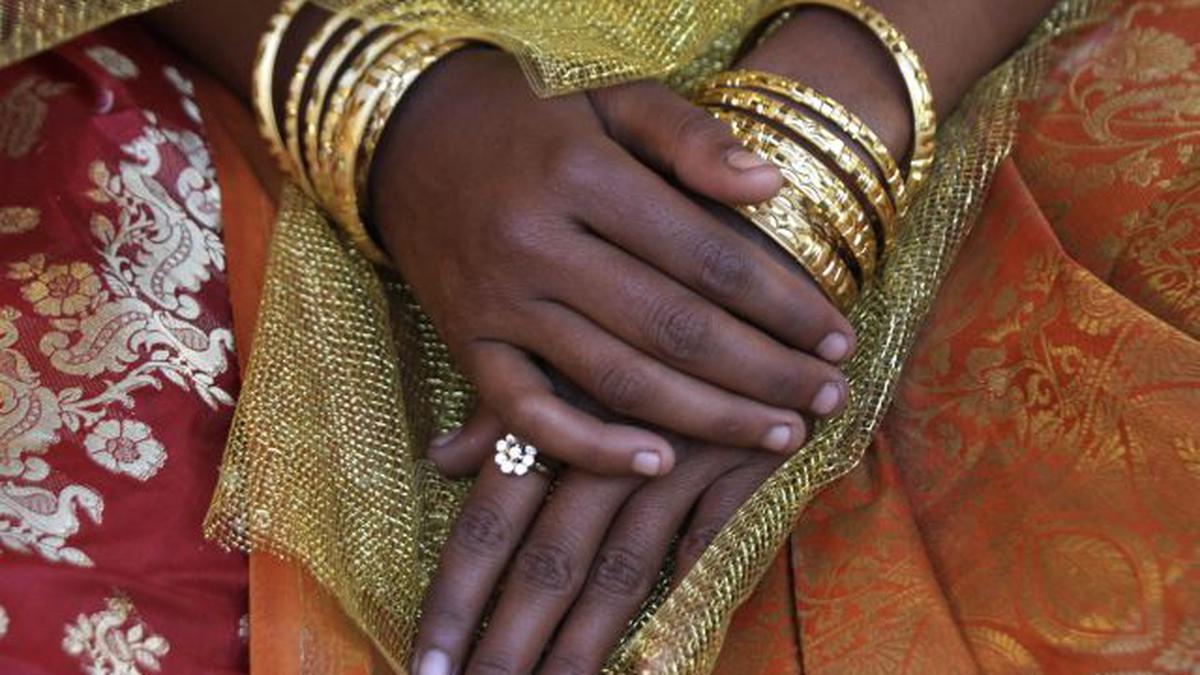A bride wearing ornaments sits during a mass community marriage of sixty couples in Kolkata, India, Tuesday, Feb. 14, 2012. Mass marriages in India are organized by social organizations primarily to help the economically backward families who cannot afford the high ceremony costs as well as the customary dowry and expensive gifts which are still prevalent in many communities.
| Photo Credit: Bikas Das
In the last three months, a string of dowry-related deaths have been reported from across India. In Aligarh in Uttar Pradesh, a woman died after a hot iron was pressed against parts of her body. Her family claimed that she had been regularly assaulted for dowry. Another woman from Uttar Pradesh’s Pilibhit was burned alive allegedly after she and her family did not meet the repeated demands of her husband and his family for dowry. In Chandigarh, a young bride died by suicide allegedly due to dowry harassment. In Tamil Nadu, near Ponneri, a woman died by suicide just four days after her wedding, allegedly due to harassment from her in-laws for dowry. Another woman from Tiruppur, Tamil Nadu, took her life within two months of marriage for the same reason.
These cases show that the illegal practice of seeking dowry continues to thrive in India. Every year, in the 2017-2022 period, an average of 7,000 cases of dowry deaths were reported across the country, according to the National Crime Records Bureau. It is important to note that these were only reported cases. As several more go unreported, the NCRB data only gives us a conservative estimate.

The numbers are alarming. And when we look closely at the data, we find that investigations into these deaths were slow and convictions were few and far between.
Of the 7,000 dowry deaths reported every year on average, only around 4,500 were charge-sheeted by the police. The rest were either stuck at various stages of investigation or disposed off for various reasons including ‘case true but insufficient evidence’, ‘false case’, and ‘complaint was based on a misunderstanding or incorrect information’. Some cases were stuck in the investigation stage for more than six months. Of the nearly 3,000 dowry death cases pending investigation at the end of 2022, 67% were stuck in that stage for over six months, as shown in the chart below.
There were also inordinate delays in filing the charge-sheet. Of the more than 6,000 dowry death cases for which charge-sheets were filed in 2022, 70% were filed following investigations that lasted for over two months, as shown in the chart below.
Even when investigations were done, charge-sheets were filed, and cases reached the court, only a few resulted in convictions. The rest got stuck in court procedures or were disposed off by the courts because they were withdrawn, or compromised, or ended in a plea bargain. In some cases, the accused were acquitted due to lack of evidence.
Of the average of 6,500 cases sent for trial every year, only around 100 resulted in convictions. Over 90% of the rest remained pending in court at various stages. If we look at the rest, some ended in acquittals, some cases were discharged before trial, and some were quashed.
Dowry was the main motive behind over 6,100 murders across India in the 2017-2022 period. Over 60% of these murders were recorded in West Bengal, Odisha, and Bihar. Cases from these three States and Jharkhand, and those in Uttar Pradesh, Madhya Pradesh, Rajasthan, Haryana and Rajasthan constituted 80% of all the dowry death cases filed in the 2017-2022 period, as shown in the map below.
Among the 19 cities in India for which data was available, 30% of all the dowry deaths cases were filed in Delhi in that period, the highest for any city, as shown in the chart below. Delhi was followed by Kanpur, Bengaluru, Lucknow, and Patna.
With inputs from Milan Cijo who is interning with The Hindu Data Team
Source: National Crime Records Bureau
Published – July 17, 2025 08:00 am IST
